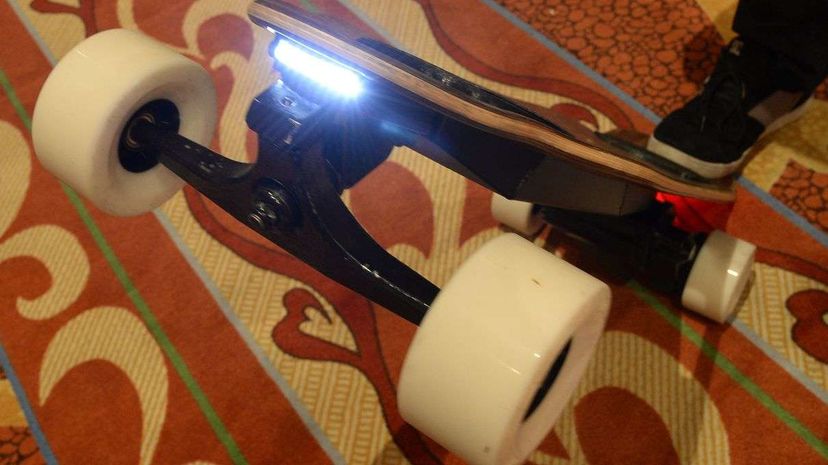
Oct. 21, 2015, the exact date that Marty McFly and Doc Brown arrived in the “future” in 1989's "Back to the Future Part II."
The closest most of us can get to "Back to the Future" hoverboards in the real 2015 is a motorized electric skateboard like the slick (and pricey) models sold by Boosted. The San Francisco Bay Area company builds motorized, rechargeable skateboards that can reach speeds of 20 mph (32 kph) — even uphill — and are controlled by a small, hand-held remote. Even with a price tag of $1,000 or more, electric skateboards are ‘rad' enough to catch on with urban commuters and high-tech hipsters.
Advertisement
Up until recently, the biggest problem with electric skateboards was that they were illegal in the very state they were designed to conquer: California. Back in 1977, California passed a law banning motorized skateboards, which at the time were powered by noisy, exhaust-spewing gas engines.
The motorized skateboard ban stayed on the books until just two weeks before Back to the Future Day, when California Gov. Jerry Brown signed a law making electric skateboards street legal effective Jan. 1, 2016. The quiet, clean-running electric models mesh with Brown's “green” sensibilities and offer a smart “last-mile” solution for commuters.
But just when it looked like the coast was clear for electric skateboards to take over the world, Wired posted a veritable how-to article on how easy it is to hack a motorized electric skateboard. Using cheap and available hardware and the right nefarious software script, anyone could take over the skateboard's Bluetooth wireless connection and slam on the brakes, sending the rider flying.
Hacking Skateboards
In the Wired article, a pair of white-hat hackers (the good guys) explained how they exploited a security vulnerability in the Bluetooth networks used by popular electric skateboards like Boosted. Because the Bluetooth wireless connection between the remote and the skateboard isn't encrypted or authenticated, it's easy enough to jam the signal or hijack it completely.
Is this kind of Bluetooth hack a legitimate threat, or just a couple of geeks having fun? Time to ask the experts.
Mike Whitman wrote the book on network security, literally. He's the executive director of the Kennesaw State University Center for Information Security Education at the Coles College of Business in Kennesaw, Georgia. What does he think: Is the electric skateboard hack a big deal?
“This is a typical example of the Internet of Things (IoT), where everyday devices begin to get networked for remote access and control. If it communicates remotely, it can be exploited,” writes Whitman in an email. “Then it becomes an arms race between vendors and hackers, patches and exploits. Hacking a skateboard may sound trivial, but hacking someone's cell phone pairing could result in break of confidentiality, and hacking someone's car is extremely scary.”
Is it negligent of companies like Boosted to release a fast-moving vehicle with such a gaping security hole? Keijo Haataja thinks so. He's a senior researcher at the University of Eastern Finland and a member of the Bluetooth Security Expert Group.
“It is somewhat strange that Bluetooth device manufacturers still do not use authentication and encryption at all in their products, especially in the devices such as e-skateboards or even e-bikes, which can surely result in severe damages for the rider,” Haataja writes. “This seems very reckless behavior towards the customers.”
For its part, Boosted posted on its website that a fix is in the works and will be available for download soon. “We are currently testing the beta version to ensure quality before we release it to all our riders. We also hope you'll join us in thanking the security researchers for working with us to make your boards safer and more secure.”
If you're still nervous, you could shell out $400 for one of those self-balancing “mini-Segways” or self-balancing scooters that are all the rage with celebrities like Justin Bieber and Wiz Khalifa. Just don't try to ride them through airport security or on any public street or sidewalk in the U.K. Totally illegal.
Advertisement